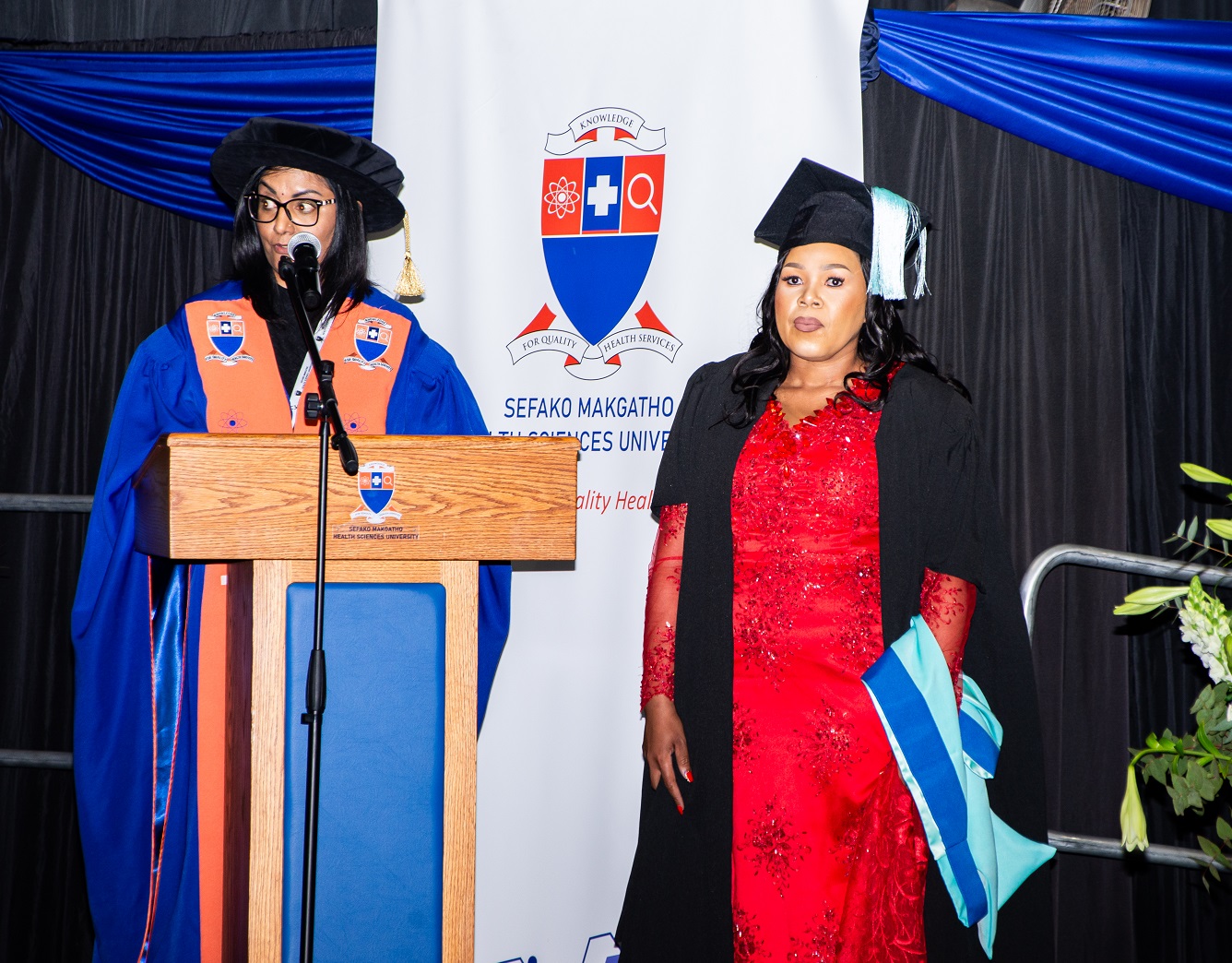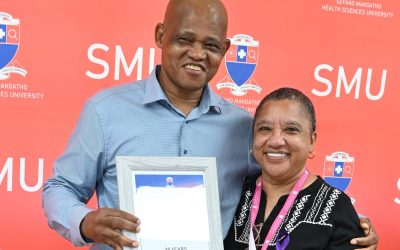Clarity signals confidence. That principle could easily describe the career of Dr Khomotjo Comfort Mothata-Motswaledi, a trailblazer who has redefined the story of Clinical Pharmacology in South Africa. She is the first to complete both the Master of Medicine (MMed) and the Fellowship of Clinical Pharmacology of South Africa [FC Clin Pharm (SA)] at Sefako Makgatho Health Sciences University (SMU) and Dr George Mukhari Academic Hospital (DGMAH), as well as in Gauteng Province.
 Her journey began far from the lecture halls of SMU. Growing up in Mmotong wa Perekisi (Limpopo), she faced the challenges of childhood obesity and the teasing that came with it. “I thought if I became a doctor, I’d find the miracle cure for obesity,” she recalls. While that cure never materialised, the determination to make a difference in health never left her. Books became her track, medicine her race.
Her journey began far from the lecture halls of SMU. Growing up in Mmotong wa Perekisi (Limpopo), she faced the challenges of childhood obesity and the teasing that came with it. “I thought if I became a doctor, I’d find the miracle cure for obesity,” she recalls. While that cure never materialised, the determination to make a difference in health never left her. Books became her track, medicine her race.
It was while working in anaesthesia that she discovered her true calling. An article by the late Professor Andrew Walubo on the emergence of Clinical Pharmacology as a speciality struck her like lightning. “It was like God saying: Khomotjo, this is your lane. Please stay in it,” she says. From then on, the course was set.
Being the first student of a brand-new programme came with its fair share of turbulence and joyrides, she remembers. “It felt like boarding a brand-new aircraft as the only passenger. At times, I was tempted to reach for the emergency exit, but with my mentors (Dr Memela Makiwane and Prof Elżbieta Osuch) at the controls, the journey touched down smoothly.”
Her dissertation, conducted at a tertiary hospital in Gauteng, examined the knowledge, attitudes and perceptions of medical doctors and pharmacists towards pharmacogenetics. The study found that while attitudes and perceptions were positive, knowledge levels were inadequate, particularly among medical doctors. These results highlight the urgent need for structured education and supportive policy to advance pharmacogenetics in South Africa – a country where genetic diversity and disease burden make its integration into clinical practice especially valuable. For Dr Mothata-Motswaledi, the message is clear: pharmacogenetics holds the potential to transform healthcare, but only if healthcare professionals are adequately prepared and the health system is strengthened to support its implementation.
 Her achievements, however, are not hers alone. She credits God, her mentors, colleagues, and most of all, her family. “My partner, Prof Hendrick Motswaledi, and our children endured the long nights, the sighs, and the endless question: ‘Mum, are you still reading pharmacology?’ Their love and patience made this journey possible.” She adds: “I also extend my gratitude to Professor Robert Summers and Dr Mabina Mogale for the strong foundation they instilled during my research/academic journey. I would not be where I am today without that grounding.”
Her achievements, however, are not hers alone. She credits God, her mentors, colleagues, and most of all, her family. “My partner, Prof Hendrick Motswaledi, and our children endured the long nights, the sighs, and the endless question: ‘Mum, are you still reading pharmacology?’ Their love and patience made this journey possible.” She adds: “I also extend my gratitude to Professor Robert Summers and Dr Mabina Mogale for the strong foundation they instilled during my research/academic journey. I would not be where I am today without that grounding.”
Today, she lectures both undergraduate and postgraduate students, drives discussions at weekly academic meetings, and advocates for stronger pharmacogenetics education and pharmacovigilance. Her mission is both urgent and personal: safer prescribing, fewer adverse drug reactions, and confidence in personalised medicine.
Her advice to aspiring healthcare professionals is both practical and motivating: “Remain curious and committed to learning. Medicine evolves constantly, and engaging with research ensures you stay at the forefront of your field.”
From Limpopo’s dusty classrooms to the forefront of Clinical Pharmacology, Mothata-Motswaledi’s story proves one thing: clarity, persistence, and passion can change the course of medicine in South Africa.
By Tumelo Moila



